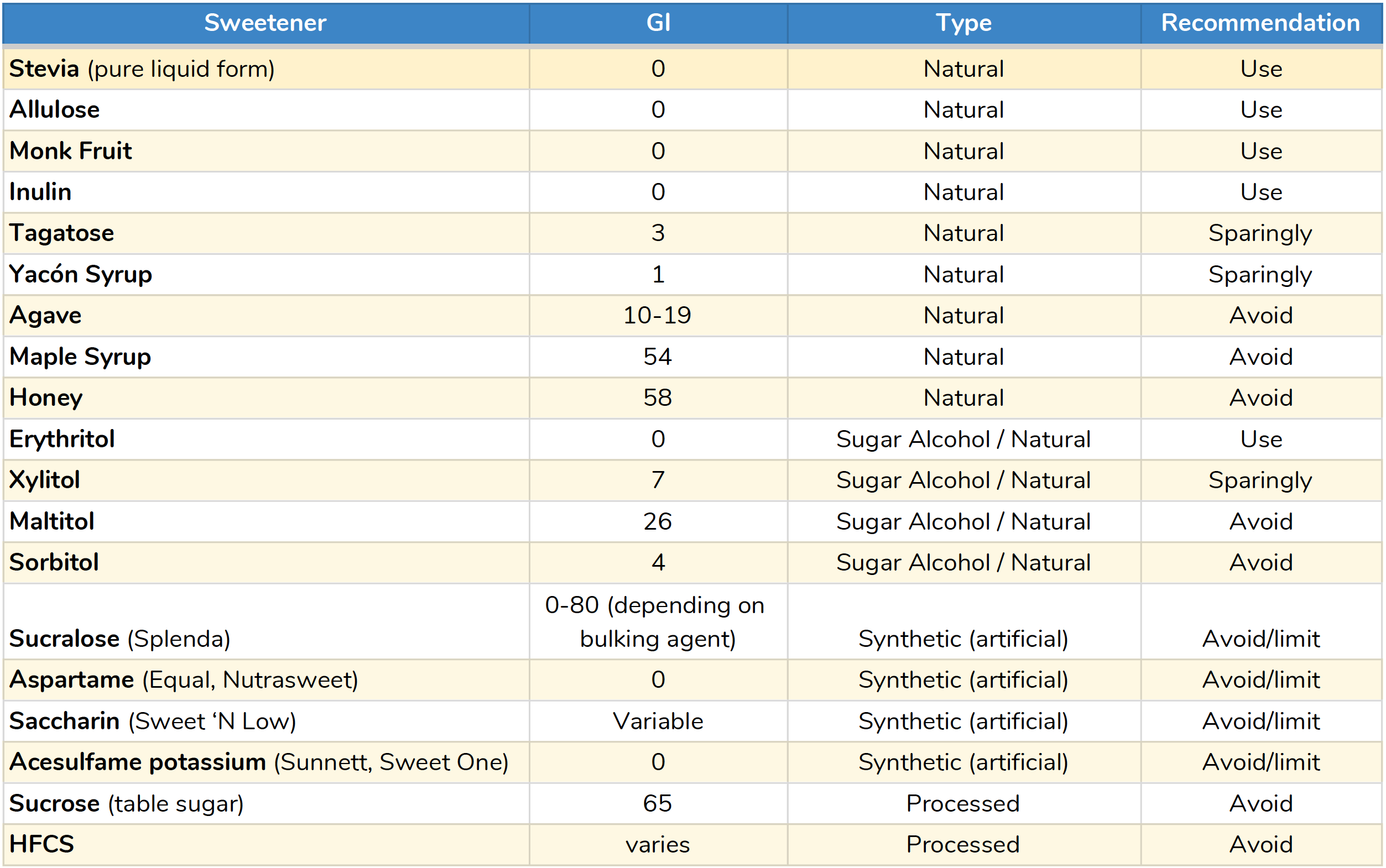
Dextrose Rice Syrup and Glucose each have a Glycemic Index of above 90 and Glycemic Load of roughly 20. In the short-term artificial sweeteners wont raise your blood sugar levels unlike high intakes of sugar.

At the end of the day sugar is sugar.
Glycemic index of artificial sweeteners. 54 rows Glucose has a glycemic index GI of 100 and fructose is 25. Sucrose Ordinary sugar which is made up of a combination of these two has a GI of 65. For more information on Glycemic Index click here.
The search for a low GI natural sugar based sweetener is somewhat futile as they all contain combinations of the above or similar sugars. The expression of the Glycemic Index is relative because the GI index is 100 with glucose. However this is not the highest value.
There are sweeteners with a glycemic index greater than 100. So lets check out a complete chart of the glycemic index of sweeteners. Dextrose Rice Syrup and Glucose each have a Glycemic Index of above 90 and Glycemic Load of roughly 20.
Conversely the sweeteners on the other end of the scale such as stevia and agave have a Glycemic Index and Glycemic Load of nearly zero. Sweeteners such as honey and maple syrup have a glycemic index somewhere in the middle. In fact most artificial sweeteners are considered free foods Free foods contain less than 20 calories and 5 grams or less of carbohydrates and they dont count as calories or carbohydrates on a diabetes exchange.
But remember that other ingredients in foods that have artificial sweeteners can still affect your blood sugar level. Sweeteners have different levels of glycemic index or GI which is a measurement of how quickly they get incorporated into the bloodstream. Glycemic Index is measured between 0 and 100 of how fast carbohydrates raise blood glucose levels.
The faster carbohydrates break down and raise blood sugar the higher the glycemic index. Despite being among the simplest of simple carbohydrates it has a very low glycemic index. The glycemic index is a way of measuring how much of an effect a food or drink has on blood sugar levels.
Low glycemic index foods are generally better for you. Artificial sweeteners sing a siren song of calorie-free and therefore guilt-free. Agave nectar may have a lower glycemic index than sugar or honey but its still up to 90 percent liquid fructose.
At the end of the day sugar is sugar. Honey or agave nectar may be slightly better for you than pure white sugar from an overall nutrition perspective but dont get tricked into thinking that they are healthy alternatives. The end result only contains 14 fructose the rest is dextrose and other sugars and carbohydrates so it is hardly high fructose it is only higher in fructose than other corn products.
HFCS has a glycemic index of 89 which is only slightly less than that of table sugar 92. The National Household Nutritional Survey estimated that as of 2004 15 of the population was regularly using artificial sweeteners. These nonnutritive sweeteners are also referred to as intense sweeteners sugar substitutes alternative sweeteners very low-calorie sweeteners and artificial sweeteners.
In the short-term artificial sweeteners wont raise your blood sugar levels unlike high intakes of sugar. They are considered safe for diabetics 15 19 20 21. The glycemic index GI is a measure of how quickly foods raise blood sugar levels.
The glycemic index for sweeteners is a function of three things. The amount of carbohydrate present. Glycemic Index and keto sweeteners.
Luckily low-carb high-fat diets like the ketogenic diet are centered around foods with a very low GI. But one particular food type continually raising eyebrows is alternative sweeteners. Although the majority of these type of sweeteners have a very low GI they are by no means created equal pun intended.
The glycemic index GI is a measure of the extent to which a food elevates your blood glucose and insulin levels. High glycemic sweeteners spike these levels flooding your body with more sugar than it can use which in turn stimulates fat storage. Glycemic index of artificial sweeteners.
A 44-year-old member asked. Can you gain weight from the artificial sweeteners. 31 years experience Bariatrics.
Most artificial sweeteners are labeled non-caloric because there is no calorie absorption and induced weight gain but more and. Low glycemic index is considered to be less than 55 medium falls between 56 and 69 and a high glycemic index is a rating of 70 or more. Glycemic impact is a more consumer-friendly method of rating foods based on their effect on blood glucose levels using low medium and high to rate the overall glycemic impact of various foods.
Like most other artificial sweeteners it was discovered by accident and it made its inventor Constantin Fahlberg rich. It is 300 times as sweet as sugar but it has a slightly unpleasant metallic aftertaste. It has a zero glycemic index contains no calories and is suitable for diabetics.